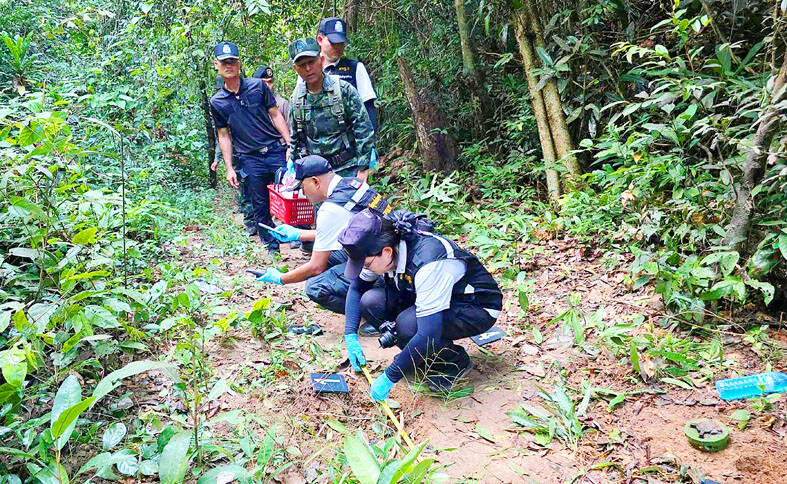“Hostilities still remain” with Cambodia, Thailand’s army said yesterday, a day after Bangkok suspended the implementation of a US-backed peace deal over a landmine blast that wounded four troops.
The deal, brokered last month by US President Donald Trump, was meant to wind down a conflict that peaked with five days of clashes in July, killing at least 43 people and displacing about 300,000 civilians on both sides.
Both sides agreed under the pact to withdraw heavy weapons from the border region and to give access to ceasefire monitors. Thailand also pledged to return 18 captured Cambodian troops.

Photo: Royal Thai Army via AFP
Cambodia said the situation on the border “remains calm.”
However, Thailand’s response suggested that tensions have returned with the suspension of the pact’s implementation.
“The truth has become clear that hostilities still remain,” Royal Thai Army Commander-in-Chief General Pana Klaewblaudtuk said in a statement.
“The Thai Army needs to suspend the joint declaration to safeguard our right to self-defense,” it said, referring to the pact.
The Thai army said that four soldiers were wounded by Monday’s landmine blast in Sisaket Province.
Apparent mine blasts wounding Thai troops were a key catalyst when tensions flared in July, igniting a long-standing territorial dispute over border temples.
The Cambodian Ministry of National Defense said it “expresses its regret” over the latest mine blast, but that the munitions were relics of past conflicts.
“After the incident, both military forces on the front lines had communicated with each other and as of now the situation remains calm,” it said in a statement.
The ministry said Cambodia “remains committed” to the peace deal, signed in Kuala Lumpur on Oct. 26 under the stewardship of Trump and Malaysian Prime Minister Anwar Ibrahim.
International Crisis Group senior analyst for Southeast Asia Matthew Wheeler said it was “predictable” that the agreement would break down.
“It was plainly concluded to placate President Trump on matters unrelated to the conflict, namely, trade and Trump’s desire to be perceived as a peacemaker,” he said in a statement.

James Watson — the Nobel laureate co-credited with the pivotal discovery of DNA’s double-helix structure, but whose career was later tainted by his repeated racist remarks — has died, his former lab said on Friday. He was 97. The eminent biologist died on Thursday in hospice care on Long Island in New York, announced the Cold Spring Harbor Laboratory, where he was based for much of his career. Watson became among the 20th century’s most storied scientists for his 1953 breakthrough discovery of the double helix with researcher partner Francis Crick. Along with Crick and Maurice Wilkins, he shared the

OUTRAGE: The former strongman was accused of corruption and responsibility for the killings of hundreds of thousands of political opponents during his time in office Indonesia yesterday awarded the title of national hero to late president Suharto, provoking outrage from rights groups who said the move was an attempt to whitewash decades of human rights abuses and corruption that took place during his 32 years in power. Suharto was a US ally during the Cold War who presided over decades of authoritarian rule, during which up to 1 million political opponents were killed, until he was toppled by protests in 1998. He was one of 10 people recognized by Indonesian President Prabowo Subianto in a televised ceremony held at the presidential palace in Jakarta to mark National

LANDMARK: After first meeting Trump in Riyadh in May, al-Sharaa’s visit to the White House today would be the first by a Syrian leader since the country’s independence Syrian President Ahmed al-Sharaa arrived in the US on Saturday for a landmark official visit, his country’s state news agency SANA reported, a day after Washington removed him from a terrorism blacklist. Sharaa, whose rebel forces ousted long-time former Syrian president Bashar al-Assad late last year, is due to meet US President Donald Trump at the White House today. It is the first such visit by a Syrian president since the country’s independence in 1946, according to analysts. The interim leader met Trump for the first time in Riyadh during the US president’s regional tour in May. US envoy to Syria Tom Barrack earlier

US President Donald Trump handed Hungarian Prime Minister Viktor Orban a one-year exemption from sanctions for buying Russian oil and gas after the close right-wing allies held a chummy White House meeting on Friday. Trump slapped sanctions on Moscow’s two largest oil companies last month after losing patience with Russian President Vladimir Putin over his refusal to end the nearly four-year-old invasion of Ukraine. However, while Trump has pushed other European countries to stop buying oil that he says funds Moscow’s war machine, Orban used his first trip to the White House since Trump’s return to power to push for